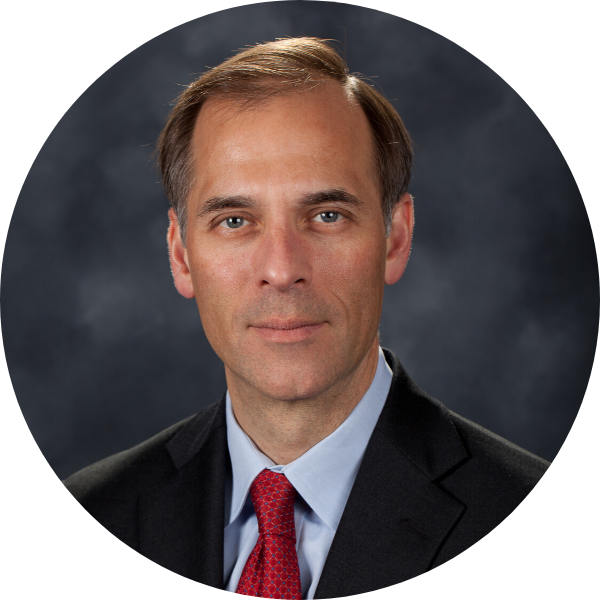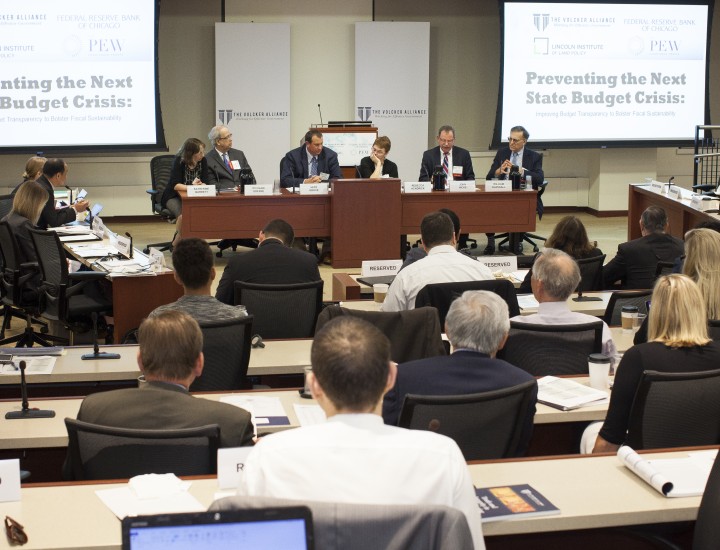Special Briefing: 2024 Fiscal Outlook for States and Cities

For America’s states and municipalities, 2024 is likely to bring long-awaited relief from inflation and higher interest rates while presenting challenges—and not just because it’s a presidential election year. States, cities, and counties will have to contend with the imminent end of $350 billion in federal pandemic budget aid even as the revenue boom of recent years cools and the need for increased spending to ameliorate the risks of a changing climate put pressure on infrastructure spending. Join our panel of experts as they discuss strategies that state and local governments are adopting to meet these challenges.
Our panel of experts will include Clarence Anthony, CEO and executive director, National League of Cities; Mayor Kim Norton of Rochester, Minnesota; Mark Ferrandino, director, Colorado Office of State Planning and Budgeting; Eric Kim, senior director, Fitch Ratings; and Mark Zandi, chief economist at Moody’s Analytics.
Moderated by William Glasgall, Volcker Alliance senior director, public finance and Penn IUR fellow, and Susan Wachter, co-director of Penn IUR, this briefing is the forty-eighth in a series of sixty-minute online conversations featuring experts from the national research networks of the Volcker Alliance and Penn IUR, along with other leading academics, economists, and federal, state, and local leaders.
Special Briefings are made possible by funding from The Century Foundation, the Volcker Alliance, and members of the Penn IUR Advisory Board.
Recordings of the entire Special Briefings series are available on the Volcker Alliance website: SPECIAL BRIEFING SERIES ARCHIVE.
Be sure to subscribe to the Special Briefing podcast, available on Apple Podcasts, Spotify, Google Podcasts, Stitcher, TuneIn, iHeart Radio and more.
Also, be sure to subscribe to the Volcker Alliance newsletter and Penn IUR newsletter.
-----------------------------------------------------------------------------------------------------------------------------------------------------
“WE’RE IN A GOLDILOCKS ECONOMY”: STATE AND MUNICIPAL LEADERS, ECONOMIC EXPERTS DISCUSS CHALLENGES THEY FACE IN 2024
Exclusive Panel Discussed the Economic Outlook and Budget Strategies State and Local Governments are Adopting in this Presidential Election Year
Overall, the panelist's outlook for state and local governments remains positive, with recent GDP data pointing to economic growth in all sectors. However, some cited for more infrastructure investment in revenue-generating areas in downtown business districts and more affordable housing to meet the demand for increased productivity.
“The truth is that the past several years have been challenging for our nation's municipalities, but they've also been full of opportunities and achievement,” said Clarence Anthony, CEO and Executive Director, National League of Cities. “There is a lot on the plates of local leaders, but city leaders are also resilient and optimistic, and they're determined to build their communities back better than ever before, in tandem with their state and federal partners. And the great news is that those dreams really are becoming reality in so many communities. A lot of this rebuilding and reimagining has been made possible by the unprecedented investment in cities in the past four years, including the American Rescue Plan Act and the Bipartisan Infrastructure Law. Thanks to the funds in those pivotal pieces of legislation, American cities, towns, and villages are making a strong and sustainable fiscal recovery from the recession that the pandemic brought on.”
“A year ago, there were a lot of calls [about a ] recession. And not only did we not get a recession, we got a fantastic year for the economy, and it does make you feel good about 2024,” said Mark Zandi, Chief Economist, Moody’s Analytics. “Obviously, there are lots of risks… there are things that can go off the rails, but I will say that for the first time in a long time, the risks are more symmetric. It's not only that things could turn out to be worse than anticipated, but they could actually turn out to be better than anticipated. I think the word is I think the word [I feel] is giddy,”
“We're a town of about 124,000 people and we’re home in Minnesota to the state's largest employer, which is the Mayo Clinic, and we are pleased to say that our local economy has rebounded fairly well from the pandemic,” said Kim Norton, Mayor of Rochester, Minnesota. “I would say revenues for the city have returned to normal but work from home, however, has impacted many of our businesses in the downtown area, and I think that's probably happening not only around the country but also the world…And we might need help from our state and federal partners on some incentives to make those expensive changes in our buildings.”
“We definitely see some headwinds in terms of revenue for the next year, but long term, we see continued growth. We also see the demand on those revenues and the demand on the state government to just continue to grow,” said Mark Ferrandino, Director, Colorado Office of State Planning and Budgeting. “We're in a strong place with our reserve and [we are] not over-committing, and that's one of the things we keep emphasizing with the legislature is we need to be smart of where we make investments and make sure we're not doing too much ongoing compared to one time [spending], especially with those one-time dollars we're getting with ARPA. Overall, I think things in Colorado are looking good, but we definitely are worried about the downside, but we keep living in an upside scenario.”
“In December, our economics team published its quarterly global economic outlook. And as we were just talking about, 2023 was a surprisingly good year. So good, in fact, that Fitch took off its recession forecast for 2024 in our last update, [and] we were one of those many in the consensus that we're expecting a recession, but we've pulled back on that,” said Eric Kim, Senior Director, Fitch Ratings. “We do still expect the economy here in the U.S. to slow; higher interest rates, a slowdown, and bank credit will continue filtering through the economy. Our expectation as of December was that real GDP growth would be below trend, just 1.2 percent for 2024, and very similar for 2025. We do expect labor markets to continue cooling, we did see a bit of that in the second half of ‘23 and the unemployment rate ticking up a little bit over the coming year, but we've also got a boost from fiscal policy. Specifically, the federal investments that are still coming under the Bipartisan Infrastructure Law, the Inflation Reduction Act, the CHIPS Act, and even some pandemic stimulus money that's still to be spent.”
-----------------------------------------------------------------------------------------------------------------------------------------------------
 Clarence Anthony is CEO and Executive Director of the National League of Cities (NLC), the largest and oldest organization representing America's cities and their leaders. Under his leadership, NLC delivered billions of dollars in direct, flexible federal relief through the CARES Act and the historic American Rescue Plan Act to help local governments respond, recover and rebuild from the COVID-19 pandemic. NLC also ushered in passage of the Infrastructure Investment and Jobs Act, delivering transformative investments in transportation, broadband and water to communities across the country.
Clarence Anthony is CEO and Executive Director of the National League of Cities (NLC), the largest and oldest organization representing America's cities and their leaders. Under his leadership, NLC delivered billions of dollars in direct, flexible federal relief through the CARES Act and the historic American Rescue Plan Act to help local governments respond, recover and rebuild from the COVID-19 pandemic. NLC also ushered in passage of the Infrastructure Investment and Jobs Act, delivering transformative investments in transportation, broadband and water to communities across the country.
Mr. Anthony began his career in public service by serving as mayor of South Bay, Florida, for 24 years. During that time, he served as president of the Florida League of Cities and NLC. Following his time in office, Mr. Anthony represented local governments on the world stage as Founding Treasurer and Interim Manager of United Cities and Local Governments (UCLG). He later founded Anthony Government Solutions, a firm focused on strategic visioning, policy development, and management restructuring for government and private sector organizations.
 Kim Norton became the first woman Mayor of Rochester, Minnesota in 2018 and took office on January 8, 2019. Most recently, Kim won a Bush Fellowship which allowed her to complete a master’s degree at the University of Minnesota’s Humphrey School of Public Affairs focused on leadership and energy policy. This work allowed her to investigate communities noted for their sustainability and livability.
Kim Norton became the first woman Mayor of Rochester, Minnesota in 2018 and took office on January 8, 2019. Most recently, Kim won a Bush Fellowship which allowed her to complete a master’s degree at the University of Minnesota’s Humphrey School of Public Affairs focused on leadership and energy policy. This work allowed her to investigate communities noted for their sustainability and livability.
Prior to her Fellowship, Kim served in the Minnesota House of Representatives, representing District 25B, consisting mostly of the northern portion of the city of Rochester in Olmsted County in the southeastern part of the state. During her ten years as a legislator, Kim introduced many pieces of significant legislation including the Destination Medical Center (DMC) economic development project aimed at positioning Rochester as a premier location for healthcare. Before serving on the state legislature, Kim served eight years, including one as board chair, of the Rochester Public School Board.
Kim participated in the Women in Power Executive Education program at Harvard University’s Kennedy School and the Rockwood Leadership Institute. She continues to serve on many local and state nonprofit boards (The Arc, Fresh Energy, KSMQ, Minnesota Children’s Museum Rochester, and Healthy Communities Collaborative) and is a member of the Greater Rochester Rotary Club. Kim is married to Randy Stone, the mother of four grown children and a stepson. She is grandmother to Zoe and Henry. She spends her personal time traveling and reading and has a special fondness for kayaking.
 Mark Ferrandino is the Director of the Office of State Planning and Budgeting. As Director he is responsible for the submission of the Governor’s budget, quarterly economic forecasts, and working with the Legislature on fiscal issues. Prior to OPSB Mark was the Executive Director of the Department of Revenue (DOR) which joined in 2020. He attended the University of Rochester, where he earned his bachelor’s degree in political science and economics in 1999, and a master’s degree in public policy analysis in 2000. Mark worked as a policy analyst for the White House Office of Management and Budget in Washington, D.C.
Mark Ferrandino is the Director of the Office of State Planning and Budgeting. As Director he is responsible for the submission of the Governor’s budget, quarterly economic forecasts, and working with the Legislature on fiscal issues. Prior to OPSB Mark was the Executive Director of the Department of Revenue (DOR) which joined in 2020. He attended the University of Rochester, where he earned his bachelor’s degree in political science and economics in 1999, and a master’s degree in public policy analysis in 2000. Mark worked as a policy analyst for the White House Office of Management and Budget in Washington, D.C.
After relocating to Colorado, he worked as program analyst for the U.S. Department of Justice, then served as the senior budget analyst for the Colorado Department of Health Care Policy and Financing until 2007 before being appointed to the Colorado House of Representatives. While in the legislature, he was elected Speaker of the House by his peers and served in that role from 2013-14. After his service in the legislature he joined Denver Public Schools as Chief Financial Officer before transitioning into the Deputy Superintendent of Operations role. Mark worked at leading several of the district's largest departments in this role.
 Eric Kim is a Senior Director in Fitch Ratings’ U.S. public finance department and head of the U.S. states rating team. He is based in New York and is a member of the tax-supported ratings group, focusing on state and local government credits in the U.S.
Eric Kim is a Senior Director in Fitch Ratings’ U.S. public finance department and head of the U.S. states rating team. He is based in New York and is a member of the tax-supported ratings group, focusing on state and local government credits in the U.S.
Eric joined Fitch in March 2007, and before joining the tax-supported group he also worked in Fitch’s education and non-profit institutions group. Prior to joining Fitch Eric was chief of staff for the first deputy commissioner at the New York City (NYC) Taxi and Limousine Commission. He also worked as a project manager at the Lower Manhattan Borough Commissioner’s Office in the NYC Department of Transportation (DOT). Eric began his career as a NYC Urban Fellow, providing research and analytical support in the commissioner’s office at the DOT.
Eric was a member of the Bond Buyer’s 2016 inaugural class of Rising Stars in the municipal finance industry and has spoken at national and regional conferences on topics ranging from infrastructure investment to Medicaid. Eric earned a BA from Brown University and an MPA with a public finance specialization from the Wagner School of Public Service at New York University. Eric is also a member of the Municipal Analysts Group of New York and the National Federation of Municipal Analysts.
 Mark M. Zandi is chief economist of Moody’s Analytics, where he directs economic research. Moody’s Analytics, a subsidiary of Moody’s Corp., is a leading provider of economic research, data and analytical tools. Dr. Zandi is a cofounder of Economy.com, which Moody’s purchased in 2005.
Mark M. Zandi is chief economist of Moody’s Analytics, where he directs economic research. Moody’s Analytics, a subsidiary of Moody’s Corp., is a leading provider of economic research, data and analytical tools. Dr. Zandi is a cofounder of Economy.com, which Moody’s purchased in 2005.
Dr. Zandi is on the board of directors of MGIC, the nation’s largest private mortgage insurance company, and is the lead director of Reinvestment Fund, one of the nation’s largest community development financial institutions, which makes investments in underserved communities.
He is a trusted adviser to policymakers and an influential source of economic analysis for businesses, journalists and the public. Dr. Zandi frequently testifies before Congress and conducts regular briefings on the economy for corporate boards, trade associations, and policymakers at all levels. He is often quoted in national and global publications and interviewed by major news media outlets, and is a frequent guest on CNBC, NPR, Meet the Press, CNN, and various other national networks and news programs.
Dr. Zandi is the author of Paying the Price: Ending the Great Recession and Beginning a New American Century, which provides an assessment of the monetary and fiscal policy response to the Great Recession. His other book, Financial Shock: A 360º Look at the Subprime Mortgage Implosion, and How to Avoid the Next Financial Crisis, is described by the New York Times as the “clearest guide” to the financial crisis.
Dr. Zandi earned his BS from the Wharton School at the University of Pennsylvania and his PhD at the University of Pennsylvania.



